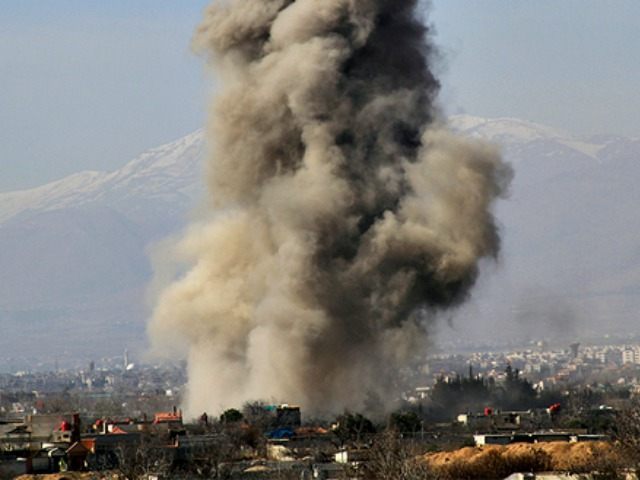The Bashar al-Assad regime, ahead of a proposed truce negotiated by major world powers, has intensified its barrel bombing campaign against opposition forces in the besieged town of Daraya, a rebel-held suburb of the Syrian capital Damascus, video footage shows.
A Syrian activist indicated on Twitter that the Assad regime, on Tuesday alone, had dropped more than 40 barrel bombs on the city of Daraya in Syria’s Rif Dimashq province.
On Sunday, the besieged town had been the target of 38 barrel bombs and six air-to-surface missile strikes, said a Syrian media activist in Daraya who filmed helicopter airstrikes, Rudaw reports.
On Saturday, the U.K.-based Syrian Observatory for Human Rights, a group that uses a network of ground sources to monitor the conflict in Syria, reported that 18 barrel bombs had “been dropped on areas of Daraya city in the western Ghouta amid clashes in the area between regime forces and Rebels.”
In January alone, the regime struck the city with 765 barrel bombs; 1,400 mortar and tank shells; nine air strikes; and 124 surface-to-surface missiles, according to Daraya’s local council, Al- Monitor reports.
Syrian dictator Assad has taken responsibility for bombing Daraya, which is located just southwest of Damascus and borders the Mezze neighborhood that houses the presidential palace.
On February 10, the official Syrian news Agency SANA quoted a military source as saying, “The army and armed forces units have carried out intensive operations on the headquarters and fortifications of terrorist organizations in Daraya, killing 37 members and destroying many of their weapons and military equipment,” reports Al-Monitor.
“The goal behind the Syrian army’s military operation is to fully secure and control the Mezze military airport near Daraya to serve as a Russian base to launch military offensives to the south,” learned Al-Monitor from an anonymous media source accompanying the Syrian army in its military operations.
“The siege of the city is the first step toward storming it in order to fully secure the area around Damascus to the southwest,” added the source.
The bombing of Daraya by the Assad regime, which is backed by Russia and Iran, has only intensified since foreign ministers from major world powers, including the U.S. and Russia, agreed to a truce in Syria during a meeting in Munich, Germany last Friday.
Within a week, said the foreign ministers on Friday, the warring parties in Syria will enact a “cessation of hostilities” leading to peace talks.
“The proposed agreement would be temporary, and would fall short of a full cease-fire,” notes National Public Radio (NPR).
Instead, the world powers agreed “to encourage their proxies to cease hostilities in a week with an eye to a more permanent cease-fire down the road,” explained NPR on Friday.
In a February 8 statement, the National Coalition for Syrian Revolution and Opposition Forces warned against an imminent massacre in Daraya by the regime forces backed by Russian forces and Iran’s Revolutionary Guard Corps, notes Al-Monitor.
“The coalition blamed the UN Security Council in particular and held it responsible for crimes against 12,000 besieged citizens, including children and women, according to the coalition’s statistics,” it adds.
The Assad regime has seized control of the area connecting Moadamiyet al-Sham and Daraya in Rif Dimashq province.
“By besieging Daraya, the regime seeks to starve out civilians by cutting off their only supply line from the city of Moadamiyet al-Sham, which agreed to a truce with the regime in January 2013. Moadamiyet al-Sham was also considered shelter for the people of Daraya when the shelling on the latter intensified,” Shadi Matar, the media official of Daraya’s local council, told Al-Monitor.
The Syrian regime and its allies reportedly embarked on an extensive military campaign and heavy aerial bombardment in December 2015 aimed at isolating Daraya.
Daraya “has already been besieged for three years, cutting off the only humanitarian supply line and weakening the opposition and civilians in preparation to storm the city,” notes the Al-Monitor.
However, the Assad forces have failed to breach the city, which “has suffered from power, water, heating and communications outages since it has been besieged by the regime forces in 2012,” points out Al-Monitor, adding, “The citizens have been burning furniture to keep warm and plastic to extract fuel to run power generators and water pumps so they can grow and cultivate crops for food.”

COMMENTS
Please let us know if you're having issues with commenting.